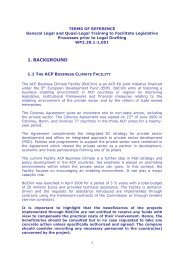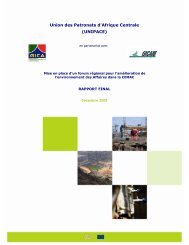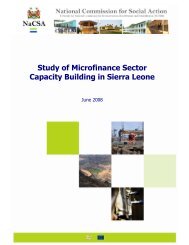(PPP) for Swaziland - ACP Business Climate
(PPP) for Swaziland - ACP Business Climate
(PPP) for Swaziland - ACP Business Climate
You also want an ePaper? Increase the reach of your titles
YUMPU automatically turns print PDFs into web optimized ePapers that Google loves.
Zizwe Vilane Amadou Traoré David Wright<br />
Day 1 // Conference on <strong>PPP</strong><br />
Opening Statements<br />
In his opening speech Zizwe Vilane, the acting CEO of<br />
the <strong>Swaziland</strong> Investment Promotion Agency, stated<br />
that it was the right moment to launch <strong>PPP</strong> projects<br />
in <strong>Swaziland</strong>. On the one hand, the government had<br />
limited resources to finance infrastructure. At the same<br />
time, various recent developments – such as the Piggs<br />
Peak Hotel, the Tolling Project, the construction of Fuel<br />
Reserves, Sikhuphe Airport, the IT and Bio Technology<br />
Parks – needed private sector involvement. He was<br />
convinced that the workshop would help to prepare<br />
<strong>Swaziland</strong> <strong>for</strong> the realization of <strong>PPP</strong>s.<br />
Amadou Traoré, Chargé d’Affaires of the EU Delegation<br />
in <strong>Swaziland</strong>, highlighted that the European Union was<br />
the largest donor in the world but that official development<br />
aid could not meet all the development challenges,<br />
no matter how important they were. A vibrant<br />
private sector capable of being the engine of economic<br />
growth is there<strong>for</strong>e necessary.<br />
As the private sector can only strive if it has the right<br />
environment the EU promotes policies at national and<br />
regional levels to strengthen enterprise competitiveness,<br />
supports good governance and the implementation<br />
of fiscal and custom re<strong>for</strong>ms, trade facilitation<br />
measures, and encourages <strong>PPP</strong>s. The EU seeks to tap<br />
the private sector’s vast resources, expertise and<br />
know-how to develop infrastructure networks in Africa<br />
by promoting <strong>PPP</strong>s based on the use of subsidies to<br />
leverage private financing.<br />
Finally, the EU representatives issued a word of caution.<br />
While <strong>PPP</strong>s were a good tool <strong>for</strong> the public sector to<br />
finance measures that were otherwise not feasible,<br />
and while the training programme would certainly help<br />
how to plan and conduct successful <strong>PPP</strong>s in <strong>Swaziland</strong>,<br />
one should not <strong>for</strong>get that <strong>PPP</strong>s are by no means a<br />
panacea that alone can overcome a country’s challenges.<br />
Introduction to <strong>PPP</strong><br />
<strong>PPP</strong> expert David Wright gave a general introduction<br />
on the <strong>PPP</strong> concept.<br />
As the term <strong>PPP</strong> suggests, a successful partnership between<br />
the private and public sector is the crucial part of<br />
<strong>PPP</strong> project. It is a contractual arrangement to deliver<br />
a service (not necessarily an asset).<br />
People often consider that the financing is the magic<br />
part of <strong>PPP</strong> projects. High ranked public officials believe<br />
that <strong>PPP</strong>s can deliver government services at no cost.<br />
However, it is important to understand that such <strong>PPP</strong><br />
projects are rarely possible and only under very specific<br />
circumstances. Usually, the government is financially<br />
involved.<br />
Key aspects that have to be considered while planning<br />
<strong>PPP</strong>s are ‘af<strong>for</strong>dability’ and ‘capacity to accept risks’.<br />
The country needs to be able to repay the investment<br />
or else it will not attract the private sector.<br />
Also, the roles of the public and private sectors in a <strong>PPP</strong><br />
need to be clarified: The public sector has to define<br />
what it wants the private sector to do. The private<br />
sector then defines how it should be realized.<br />
There are several categories of countries if classified<br />
according to their use of <strong>PPP</strong>. Many countries still do<br />
not have such projects at all. Some have extensive<br />
experience. Yet others have a few <strong>PPP</strong>s which are<br />
plagued with problems, such as lack of transparency<br />
5

















